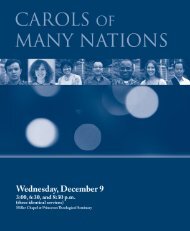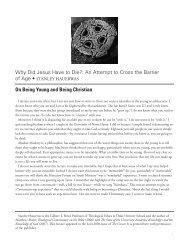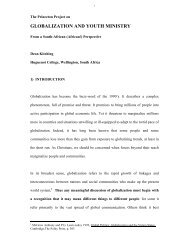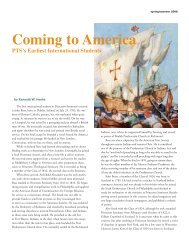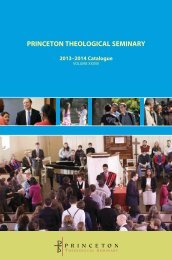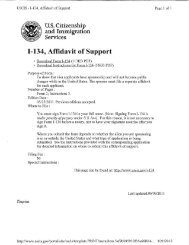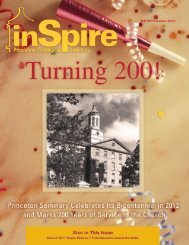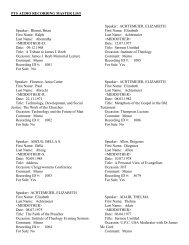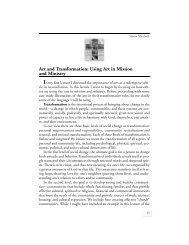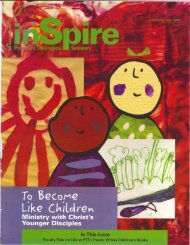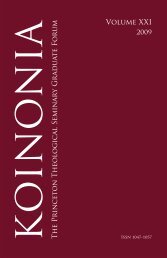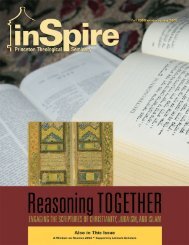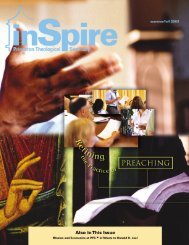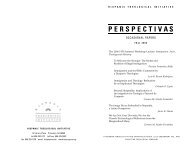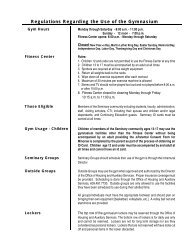Faculty - Princeton Theological Seminary
Faculty - Princeton Theological Seminary
Faculty - Princeton Theological Seminary
You also want an ePaper? Increase the reach of your titles
YUMPU automatically turns print PDFs into web optimized ePapers that Google loves.
mission history and theology, ecumenical history and theology, and the interaction<br />
of the Christian faith with other religions and secular ideologies, Mission,<br />
Ecumenics, and History of Religions encourages interdisciplinary approaches that<br />
draw on all <strong>Seminary</strong> departments.<br />
Residence Requirements<br />
The program in Mission (theology and history), Ecumenics (theology and history),<br />
and History of Religions includes, as the name implies, three major divisions<br />
of this field of study. It requires the successful completion of eight seminars (or<br />
their equivalents) during two years of residence. Of these eight seminars, at least<br />
six should be taken on the research track, which entails, in addition to any other<br />
requirements set by the instructor, the writing of a major research paper. As many<br />
as two seminars may be taken on the reading track. Decisions about seminar tracks<br />
should be made in consultation with the student’s residence committee. Though<br />
the student may concentrate during the two years of required residence in any one<br />
of the three fields, he or she will normally be expected to take at least one doctoral<br />
seminar (or its equivalent) in each of the three major divisions. The remaining<br />
five course requirements may be taken from doctoral or mid-level courses in this<br />
program, other offerings in the History and Theology Departments, offerings in<br />
the pertinent fields at the <strong>Seminary</strong> or at <strong>Princeton</strong> University, or special reading<br />
courses, as approved by the student’s residence committee. If mid-level courses<br />
are taken for credit, additional work will be required. Students are also expected to<br />
attend the History Colloquium for two years.<br />
Early in the period of residence, students should discuss possible thesis topics with<br />
their advisers. The research topic, which must be approved by the department by<br />
the end of the second year, should be prepared following the departmental guidelines<br />
available from the residence committee.<br />
Comprehensive Examinations<br />
The program offers six fields of comprehensive emphases:<br />
1.Missional theology as a global (i.e. Western and non-Western) and<br />
multicultural engagement with the classical theological disciplines<br />
2. History of Christian mission, historical and contemporary<br />
3. The ecumenical character of Christianity, engaged historically<br />
and theologically<br />
4. Study of one or more non-Christian religions, with reference to both<br />
Western and non-Western contexts<br />
5. Theory and methodology for the history of religions in relation to<br />
interreligious dialogue, comparative theology, and theology of religions<br />
6. Social theory for the study of world Christianity in cross-cultural contexts<br />
Of the five comprehensive examinations to be taken by doctoral students after the<br />
completion of their two-year residency, there will be at least one each in the areas<br />
emphasized by Mission, Ecumenics, and History of Religions.<br />
e 63 f<br />
cat0809



